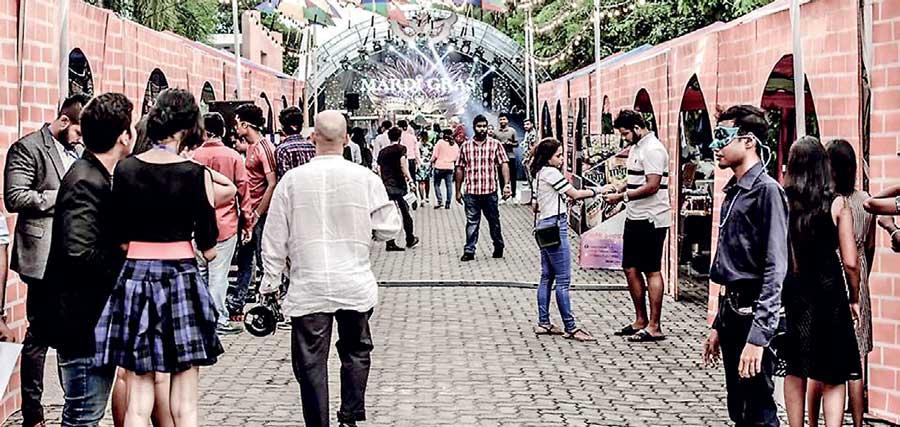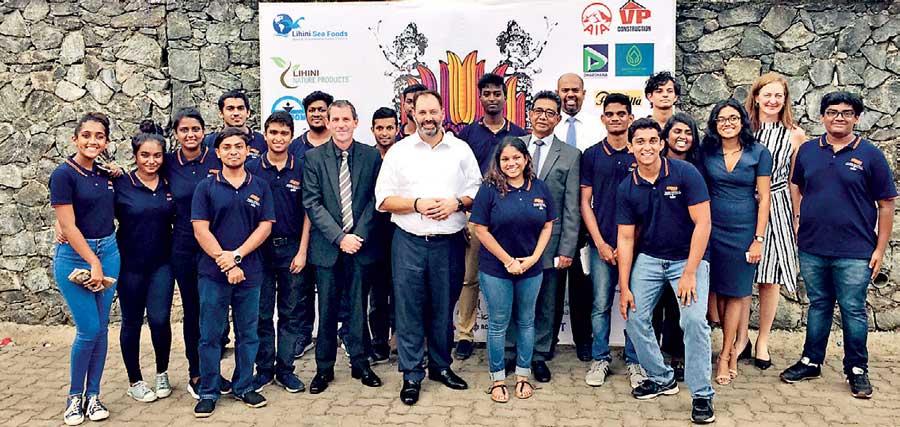Reply To:
Name - Reply Comment


 The high-potential tourism industry is the next game-changer in the Sri Lankan economy, however, Sri Lanka lacks conceptual requirements and is in dire need for creative tourism, innovation with technology and knowledge-based decision making.
The high-potential tourism industry is the next game-changer in the Sri Lankan economy, however, Sri Lanka lacks conceptual requirements and is in dire need for creative tourism, innovation with technology and knowledge-based decision making.
Tourism should be recognised in public policy, and the government should ensure political stability and political vision towards tourism.
It must also be noted that Sri Lanka Tourism must be aligned with the Sustainable Development Goals (SDGs), as globally, tourism is affected by climate change and disposal income.
Conference diplomacy is the most powerful multilateral element to address contemporary review of knowledge, public policy, innovation and synergy in groundbreaking strategies for better future.
Sri Lanka is a country which offers many aspects of tourism to the world and meetings, incentive travels, conferences, exhibitions and events (MICE) tourism is one which is getting a considerable amount of attention in the present days.
Although the lack of suitable infrastructure limits the country’s potential to grow as a MICE tourism hub, the development which is happening across the island depicts positive outcomes, which will in turn aid in the growth in MICE tourism.
Events Industry in the Global Context
It has always been a competitive industry as we have to equally work with almost all the parts of the globe in some cases. The most important city when it comes to MICE is Paris, taking in the largest number of events because they create their own events and they market their culture, heritage and their culinary aspects and have a well-established work plan.
Competing with a country as such is really difficult for the other parts of the world which is why these destinations are not changing their competitive stage. Cities like Paris, Barcelona, Madrid are all top meeting destinations in the world historically and are not being changed.
The most important MICE destination in Asia which is Singapore, doesn’t have a culture older than 100 years. Singapore has become a hub for new culture and new generation. People are being attracted to the country and every year something new is being added to the destination. The same scenario applies to Dubai which was previously a colony of Pirates. But currently, Dubai is one of the most attractive nations for MICE tourism in the Middle East. So either it is created values or traditional.
More weight on the culture and Technology: Many other Asian countries have traditional cultures. Countries like Indonesia, Thailand and India all have their own particular cultures. It is adding value to the culture with new aspects; new convention centres probably with a particular web 5.0 generation of technology and various other technical aspects. As such, culture still plays a major role in MICE tourism.
Recommendations
1: Identify a business lead, ascertaining target markets in modern context: MICE tourism is not only limited to conferences in the modern context; social events such as weddings, musical shows are all part of the MICE industry. There are a lot of professionals who are involved in this. High revenues (higher yield) can be expected from the MICE business.
Open sky policy: Country needs to develop the product and bring its level up. So there’s no surprise in the government considering an open sky policy; connectivity will be broadened and business can be fortified. Targeted businesses are given consideration to as people need to travel to the country.
Markets: Having over 450 international airports throughout the world and all the countries looking for growth in that area, MICE is becoming a very competitive market.
Middle East Air-Connectivity: Sri Lanka’s connectivity with the Middle East via air lines play a prominent role in getting the appropriate market to travel to the island for various events.
Assortment of Products: As Sri Lanka is one of the top islands of South East Asia with safety, good weather, quality people, eye catching beaches, a vibrant culture, heritage, mountains and wildlife, getting MICE business is not difficult.
India Global Rank: India is one of the top areas to look at because it has all the global corporates.
Time Factor: All the people who are working are Indians and it’s much easier to get the Indian market as one flight from Bangalore to Colombo would be the same time frame as an internal flight.
Indian Weddings: MICE market should target destinations where it’s easy to get people from. And apart from simply conferences and exhibitions, attention should be given also to holding Indian weddings in the country.
Wedding Duration: Indian weddings are held for four or more days with 5,000 to 6,000 guests and an immense amount of money is spent.
Yield: Millions of dollars are spent on one Indian wedding at the hotel. So the MICE market is not limited to conferences and exhibitions.
Celebrity Endorsements: People can be attracted to the country by having events featuring top entertainers. Events that will make people participate from other countries need to be given consideration too.
ASEAN: In this region, there’s a growth in the ASEAN market as people are travelling.
Strategic Location: Sri Lanka’s geographical location and associations with the far eastern and western countries have a major impact on the country getting business.
Sea Connectivity: Sri Lanka can provide safety for cruise ships. There are MICE events where they take a cruise and come to a MICE event in the country, have their conference and then get back to the cruise.
Cruise Terminals: This is the reason behind a cruise terminal being considered to be built in Colombo in the future because this is an important factor in tourism.
2: Bidding for events, pre and post bid activities, direct and indirect lobbying
Spin-off benefits
Duration of Stay: MICE tourism also brings in the high-end, up-market business to a country. They spend more time and there’s an 80 percent likelihood that the travellers can come back to the same destination for an event. Generally, conference delegates arrive and after spending about two to three days, to realise the country’s beauty and that they should bring their families.
Creating investments opportunity: Events are linked to creating investments where spin-off benefits can be created.
Additional support services: As MICE also calls for additional support services, more people are needed, thus creating more direct and indirect employment. It is easy for a country to promote MICE and then move into leisure.
Investment on multi-purpose convention centre: Build Sri Lanka to consider MICE as an extension of tourism even though it is a separate industry. Unfortunately, Sri Lanka does not have a purpose-built multi-purpose convention centre. Even though the island nation has BMICH, Nelum Pokuna, Water’s Edge and so many other places, none of these are purpose-built convention centres.
Infrastructure developments essential before holding major MICE tourism campaigns: Although MICE is growing alongside tourism in Sri Lanka, the targets for MICE arrivals is not as ambitious as tourism figures. The reason for this is that infrastructure needs to be developed before holding any major MICE tourism campaigns. The difference between MICE and leisure is that the target audience for MICE tourism is the associations, corporations and institutions.
Private-public-partnership for global competition through synergy
Global Competition: When Sri Lanka is bidding for an event there are other competitors who are looking to have those events in their countries. The bidding process is such that before bidding for an event, the reason for having a particular event and its impacts on the country’s tourism and economy is taken into consideration. Research is done to a large extent. Sri Lanka, despite of difficulties and infrastructural needs, continues to do well in the MICE sector.
3: Planning, organising and implementation of MICE and events and monitoring performance
Creativity: In order to survive, one has to be creative as this is expected from employees in the MICE industry. People always want a different experience. If Sri Lanka can’t create something new, the country won’t be able to survive. If Sri Lanka can, then clients will be ready to pay anything for their concept.
Timing: Sri Lanka’s government must also be very fast when responding to hold foreign events in the country as there are other countries which are competing with Sri Lanka for the same event.
Flexibility: Flexibility is of importance as well. The client might ask for a thousand things so Sri Lanka’s government should be flexible with red tapes. The government must always be flexible and try to understand the customers’ needs and service accordingly. There should always be good leadership with a person within the team to lead the project and be responsible. Knowledge in finance is a key necessity, because some clients will give the budget whereas some will not and an understanding of the destination point of view and the local competition is needed to do the financing.
Private sector: The Sri Lanka Association of Professional Conference Exhibition and Event Organisers (SLPCEEO) is the private sector or the industry body for meetings, conference and exhibition organisers. New convention centres and infrastructure development with private sector involvement is also essential.
Wedding planners are recognised as a MICE industry stakeholder. Essential to identify corporate meeting planners and conference organisers (PCO). Identify people who handle incentives; incentive houses and exhibition organisers are called PEO. Identify entertainment event organisers and planers as event management companies.
Multi-stakeholder involvement: In the suppliers’ point of view, MICE stakeholders involve conference centres like BMICH, exhibition centres like SLECC, hotels, airlines and cruise ships. The usage of the meetings and conventions departments of hotels is now a growing trend.
4: Macro and micro environmental factors on MICE, government policies and level of integration of MICE into other economic development
Hyper competition
Diplomacy and Diplomatic Relations: It has always been a competitive industry as Sri Lankan government needs to equally work with almost all the parts of the globe in some cases through public, cultural and economic diplomacy. A well-established work plan for top meeting destinations in the world; competing with a country as such is really difficult for the other parts of the world which is why these destinations are not changing their competitive stage. Cities like Paris, Barcelona, Madrid are all top meeting destinations in the world historically and are not being changed.
Economic Cycle: The other important factor is the culture and authenticity. When thinking about the cultural aspect, the traditional MICE destinations like Paris, Madrid and Venice rely on their culture.
Policy and strategic direction for MICE ideology in the world: When government thinks about the policy and strategic direction, it needs to recreate the destination brand and create an ideal MICE destination because Sri Lanka is famous as a tourist destination. So, re-branding our country as a MICE destination is an important factor.
Integration of Professionalism: As a land which has marvellous natural settings, wildlife and more is all good, MICE is all about the integration of professionalism. Quality and technology to give an unique experience is essential and integration of the stakeholders is also important.
Political stability and political vision: Huge potential to develop incentive and conference marketing in the country as Sri Lanka has a high literacy level, high IT literacy levels and telecommunication. Incentive wise Sri Lanka has entertainment which isn’t available in India: Sri Lankan people enjoy night life, casinos and high level of entertainment and facilities.
Recognition of tourism promotion in public policy through policy stakeholders: Sri Lankan MICE tourism to move forward globally, with integrated sustainable solutions are significant in predictable public policy making. The national policy of Sri Lanka needs to define country’s place in the European Union via quality-strong governance, multicultural society, diaspora, consolidated diplomacy, a Rule of Law based system, Sustainable Development Goals (SDGs), reconciliation and finally promoting and protecting human rights should console the public policy.
Policy Stakeholders following national policy stakeholders should be in the priority lane; accountable executives professional bureaucracy at the first place, bilateral, regional and multilateral agreements, highly connected political, economic and cultural network, geo strategic location of Sri Lanka in the Indian Ocean promoting sustainable MICE tourism concepts such as marine tourism, marine parks, marine zones, and cruise tourism and more.
Policy environment needs to focus on the globally accepted ‘VICE’ model of tourism promotion:
Abstract to implementation, sustainable cites, holistic waste management, agenda setting, policy innovation, price elasticity sustainability of transformative tourism demonstrative projects (TTDP): The four major Chinese infrastructure projects such as Mattala International Airport, Sea Port in Hambantota Port City and Shangri-La mixed development projects have given a shoulder to the tourism industry between 2010 and 2019 to manifest the long-term vision in MICE tourism Sri Lanka.
Way Forward
“Integrating the management participation for MICE tourism development and promotion in Sri Lanka”: An attempt is made here to highlight six main factors regarding MICE tourism development and promotion of Sri Lanka.
1: Impact of integrated sustainable solutions in public policy to promote MICE tourism in other countries: Predictable public policy, accountable executives and professional bureaucracy.
2: MICE tourism promotions through Ministry of foreign Rations in globally: Economic diplomacy, cultural diplomacy and public diplomacy.
3: ICT development for MICE tourism industry in Sri Lanka: Search engine optimisation and social media in digital hospitality and tourism
4: Aviation/Maritime-Enhancing Connectivity: airlines, shipping lines and global cultural similarities
5: Industry networks, hotels, media and destination management companies: International media and facilitates media crew
6: Liveable and vibrant cities for MICE tourism development: Art galleries, museums , performing arts, media, high energy places and spaces